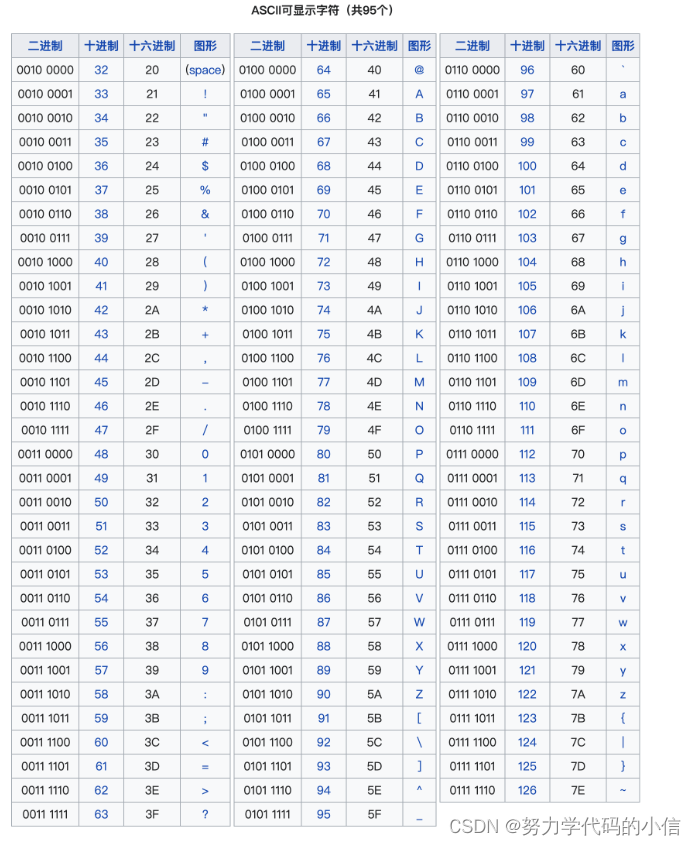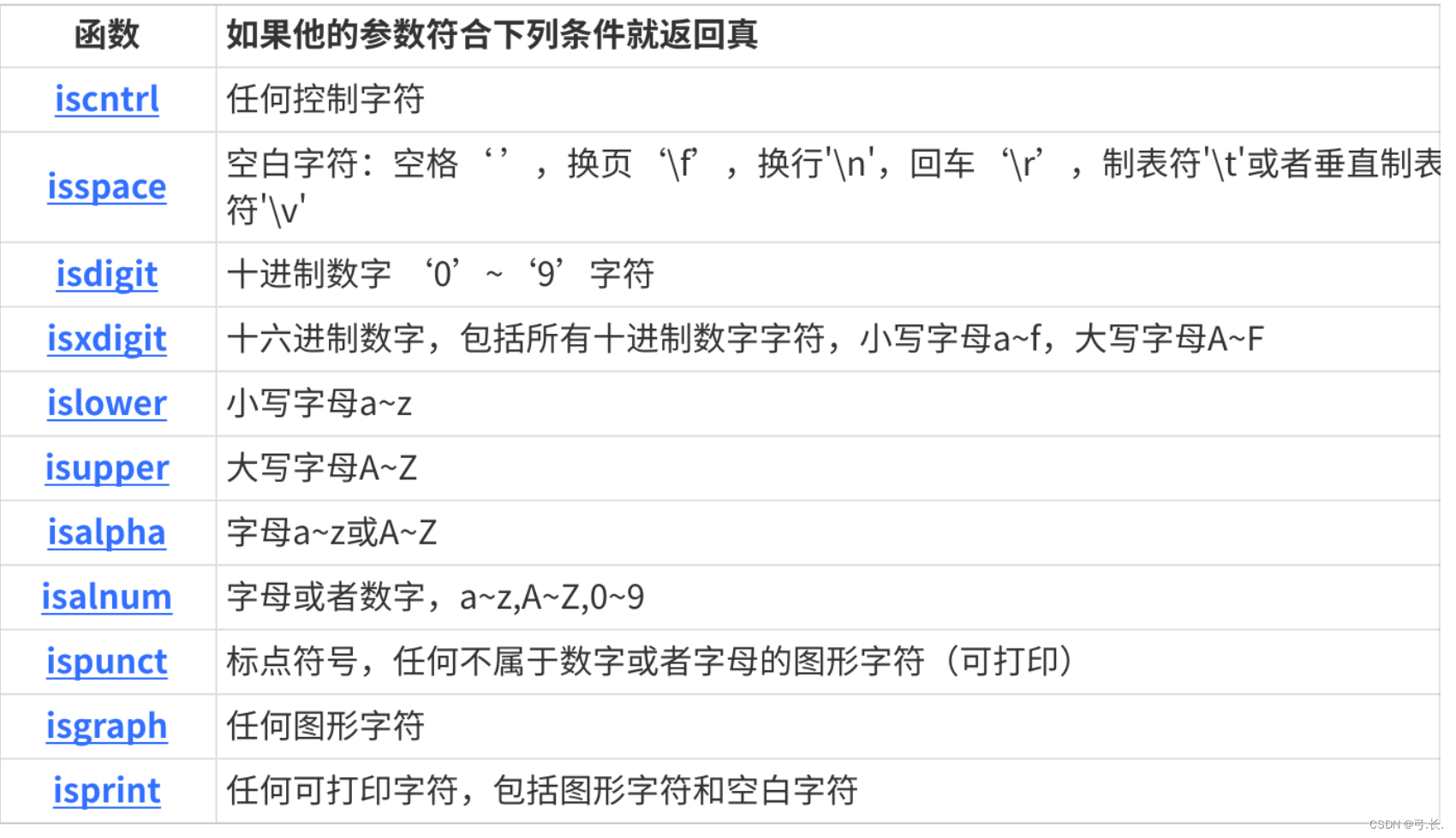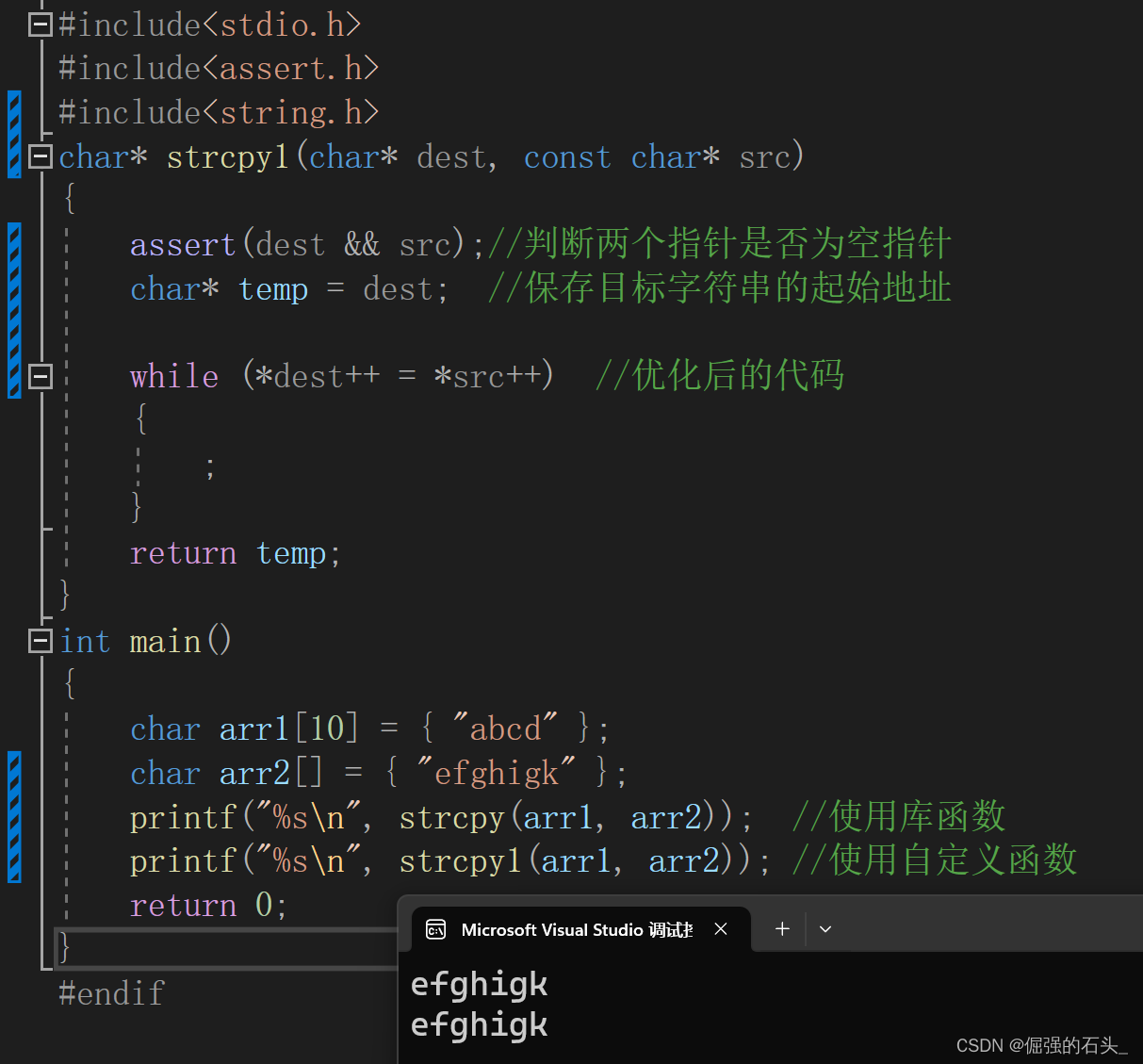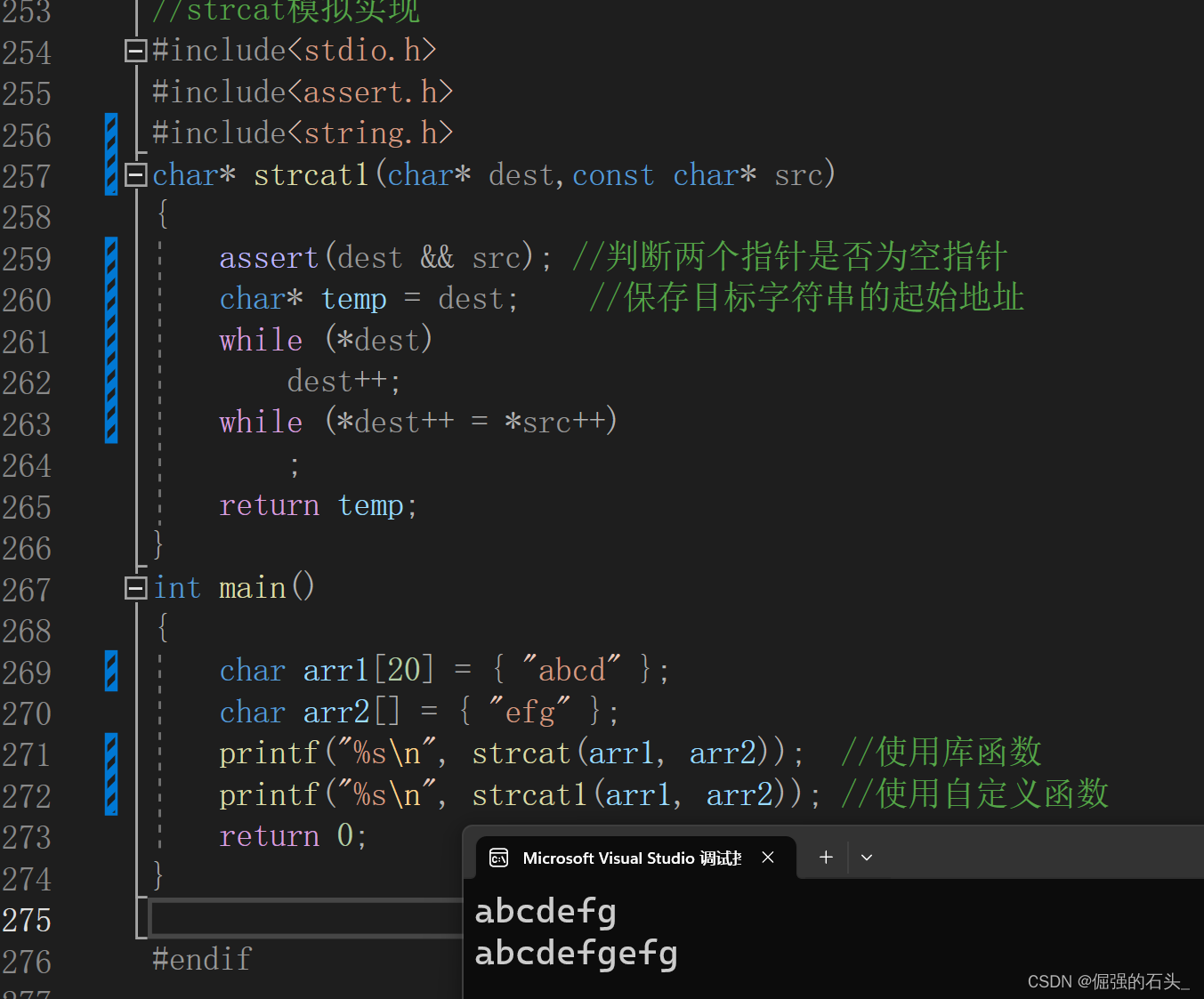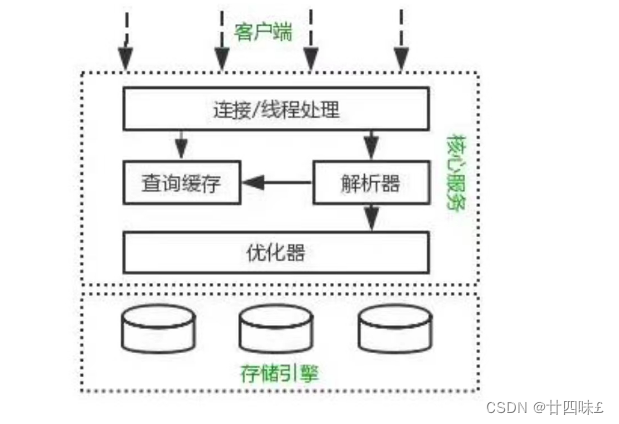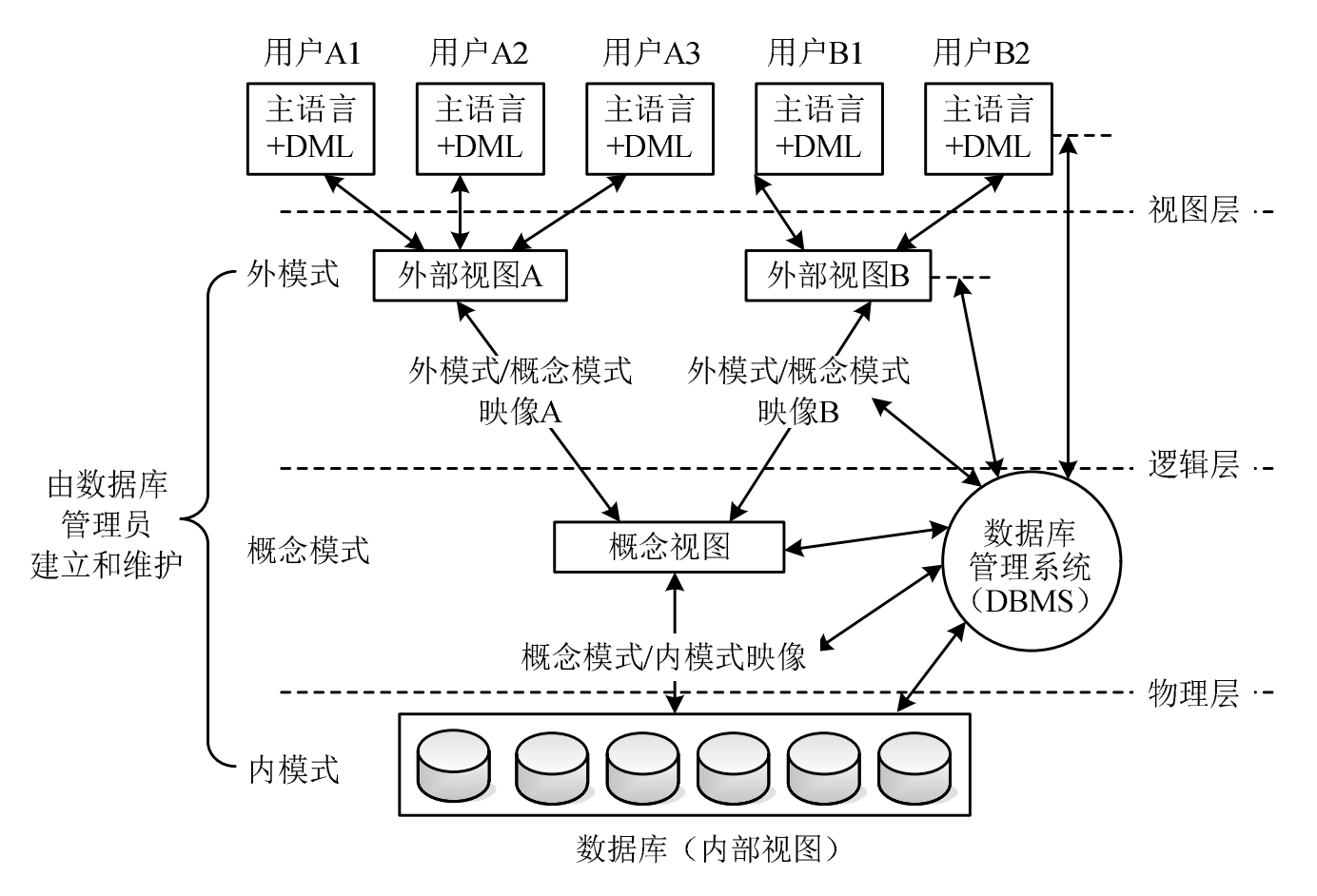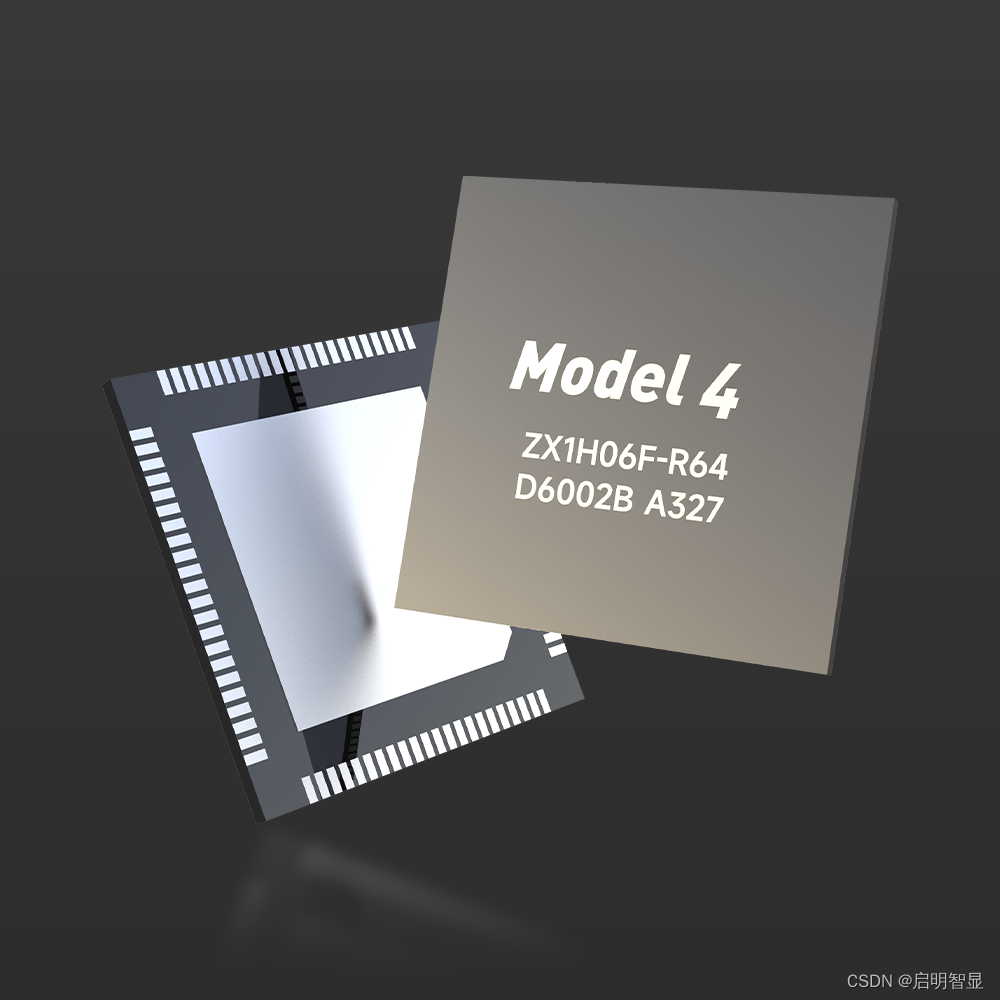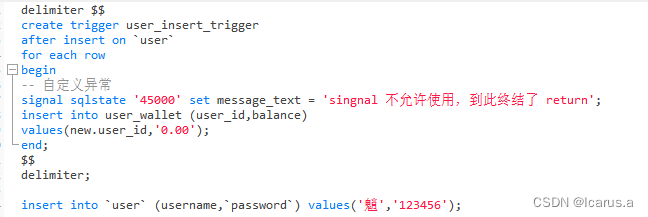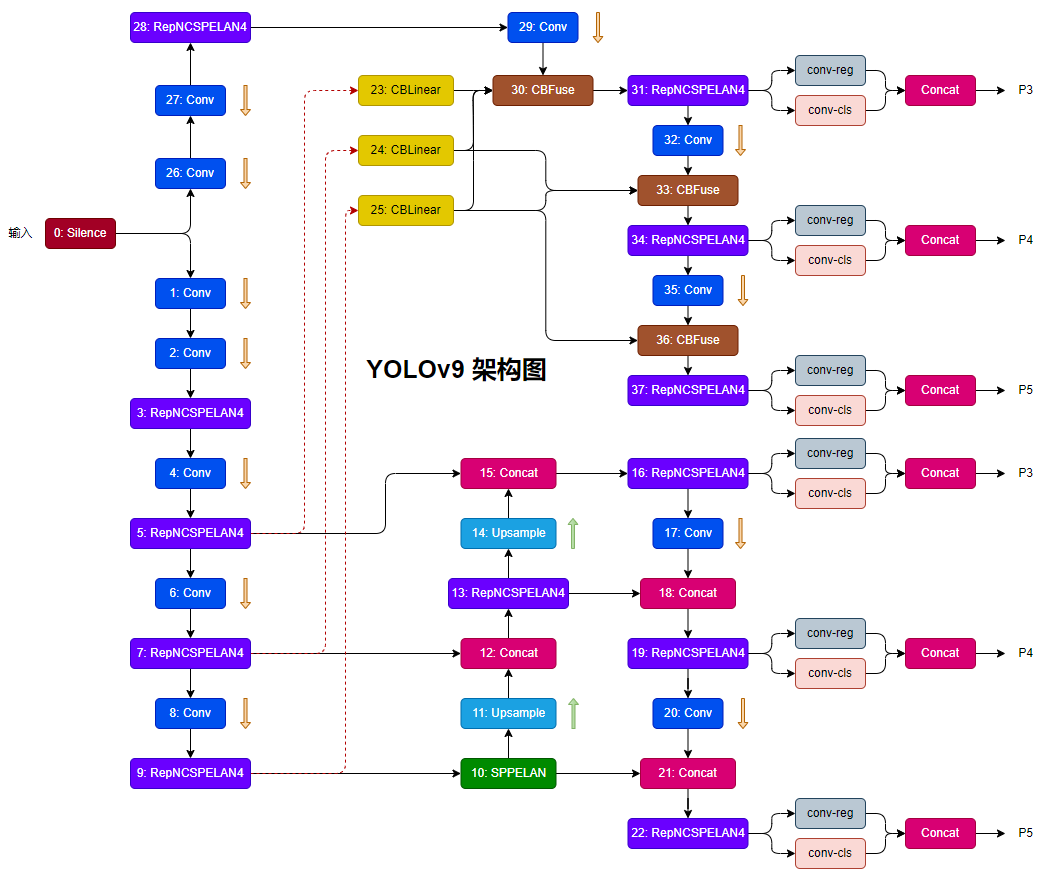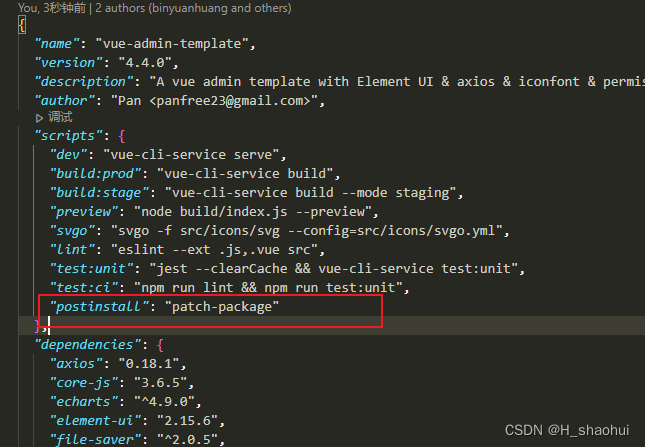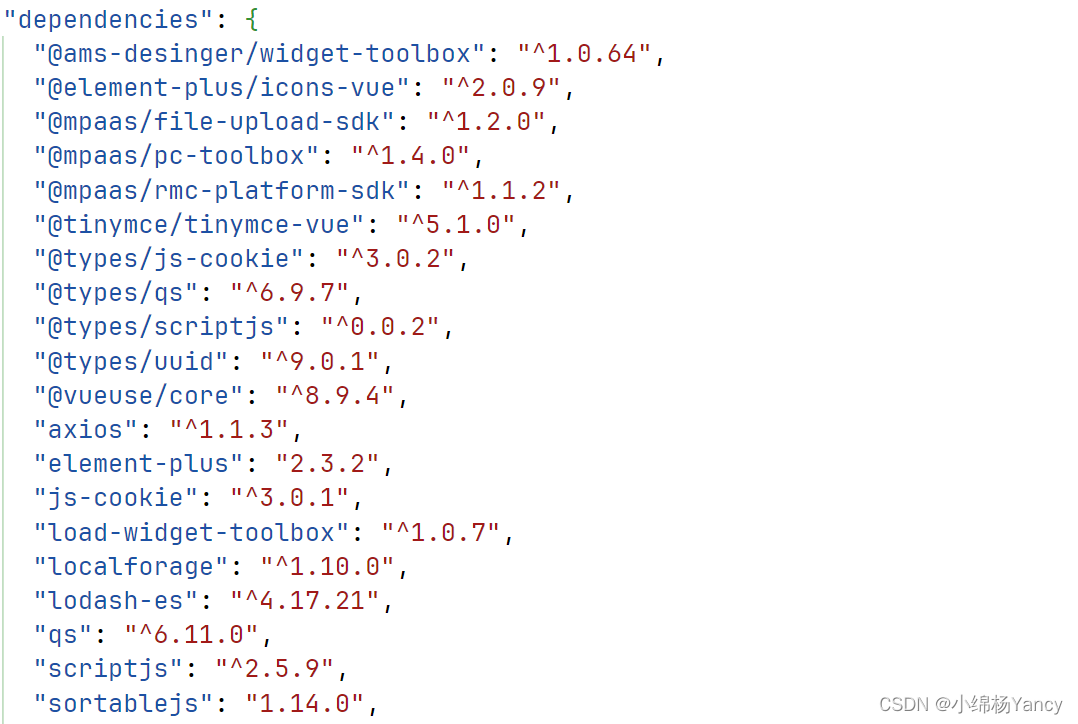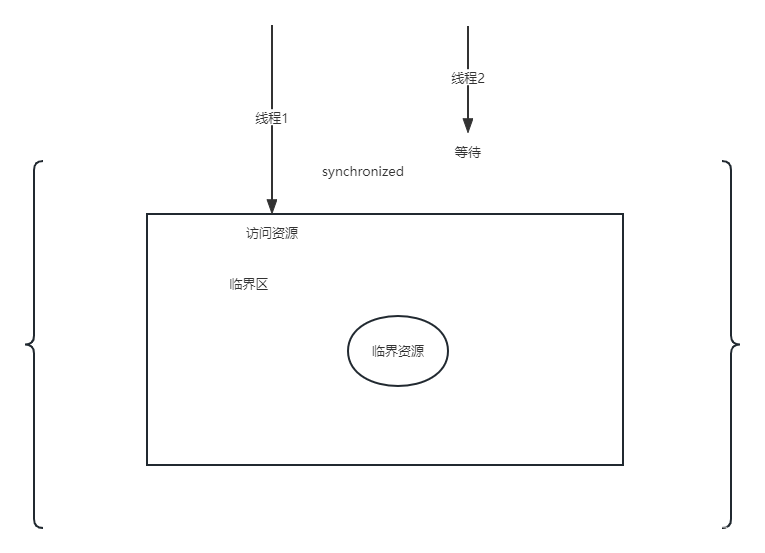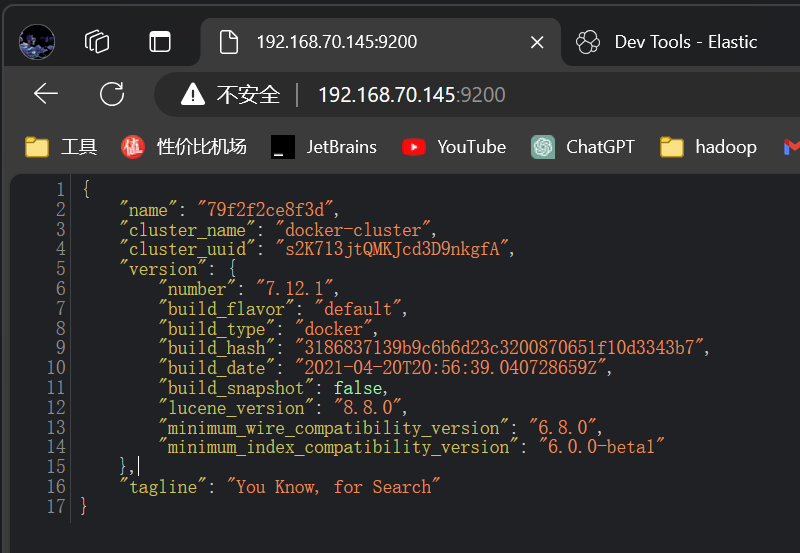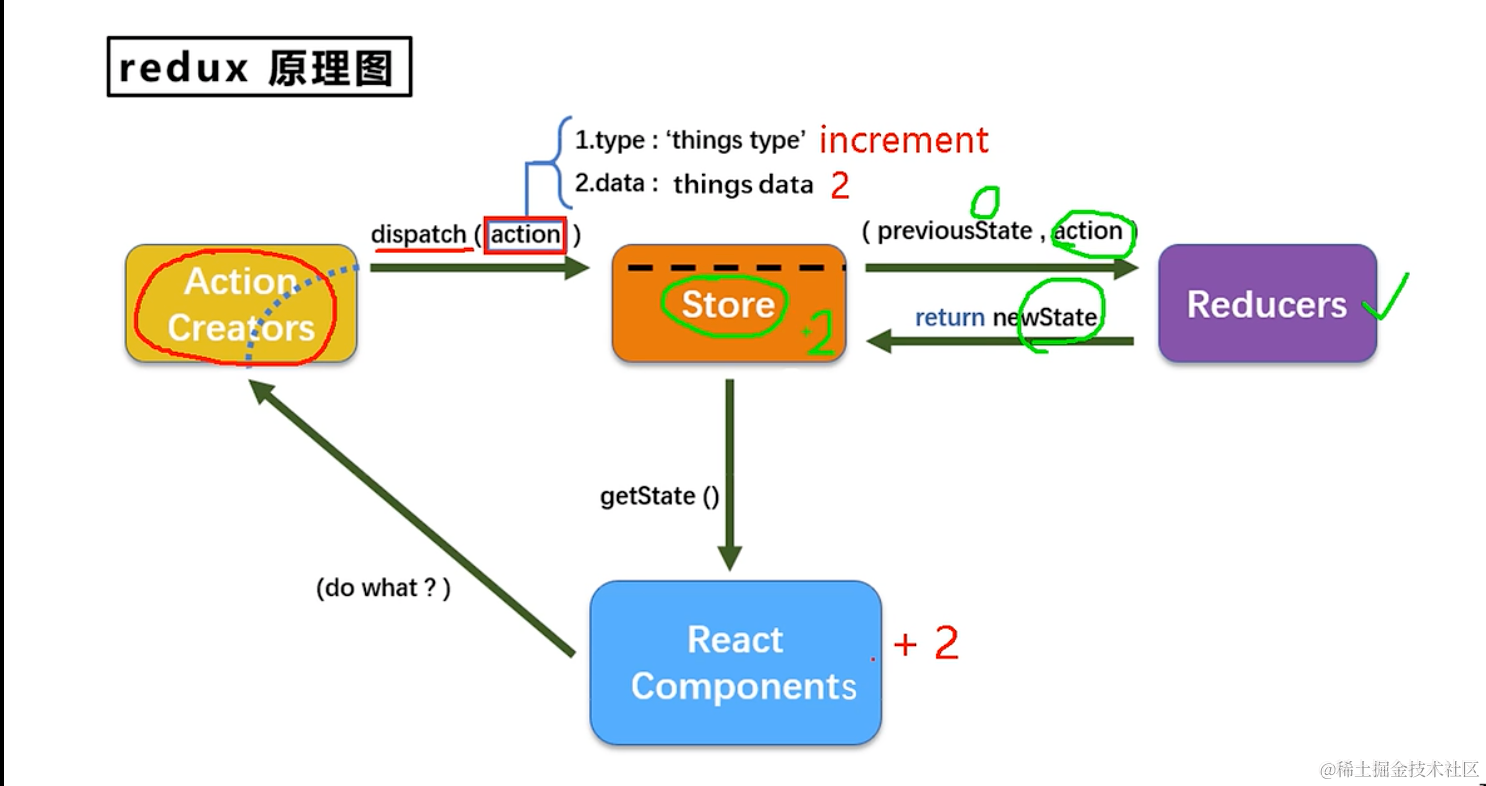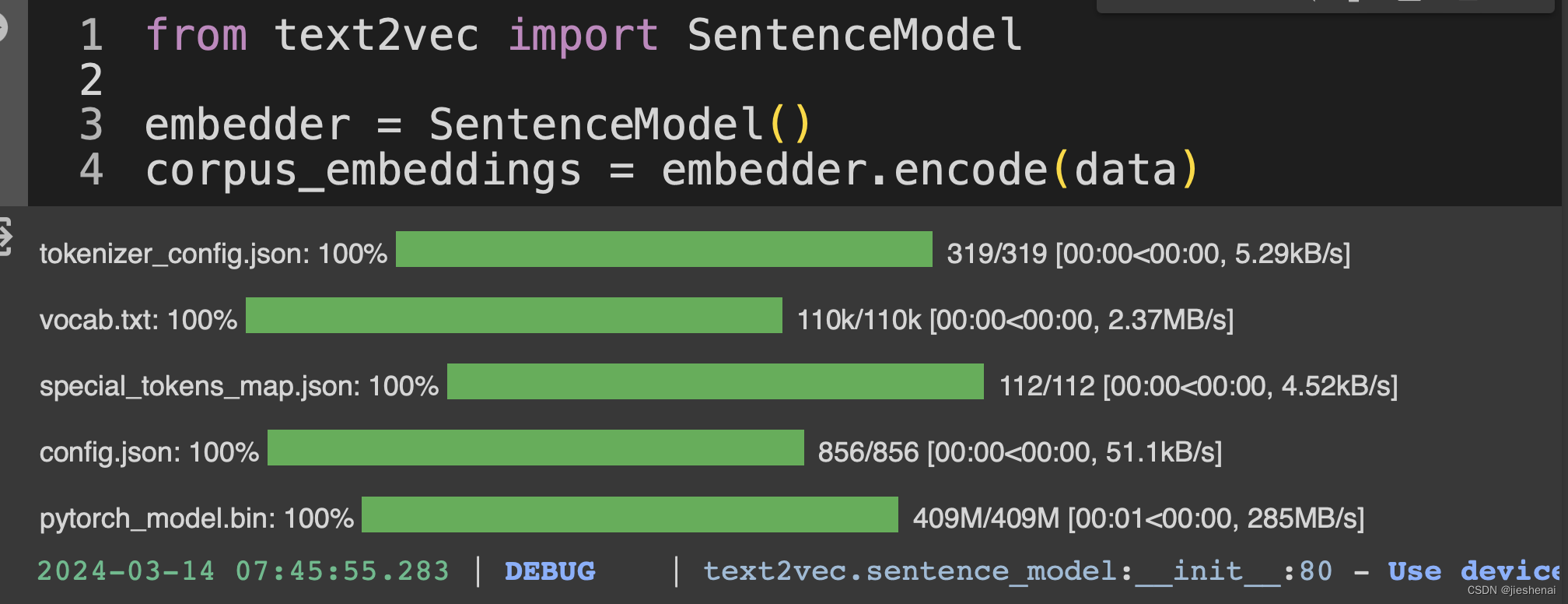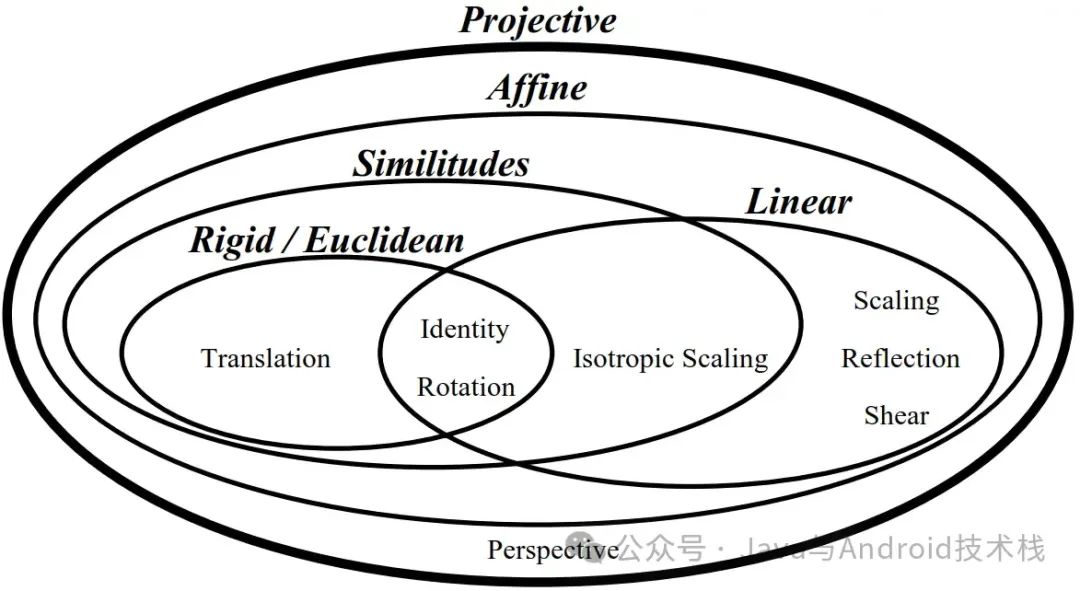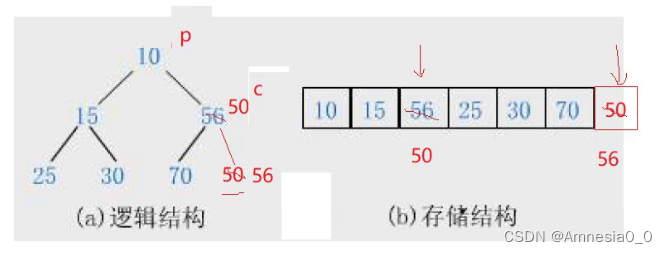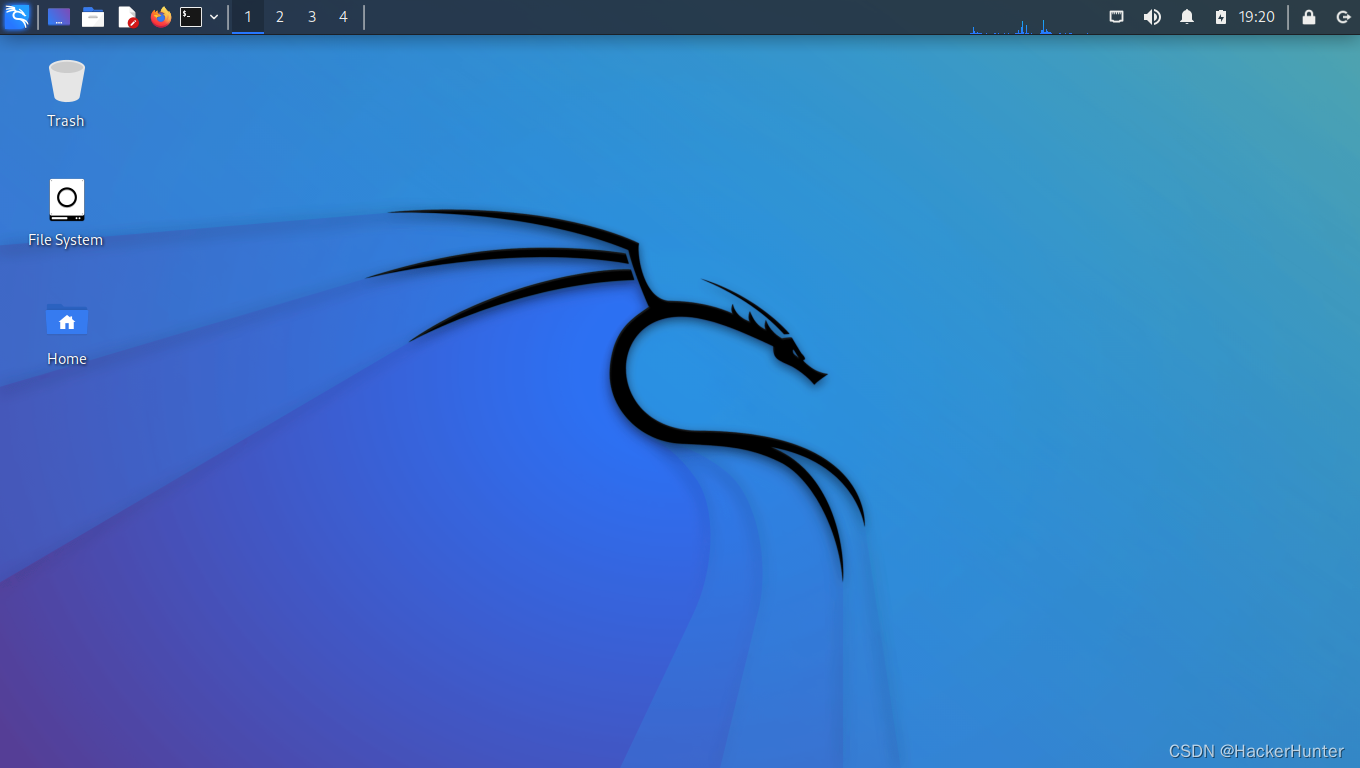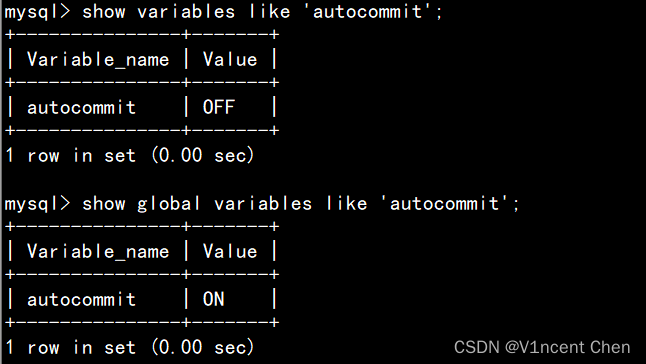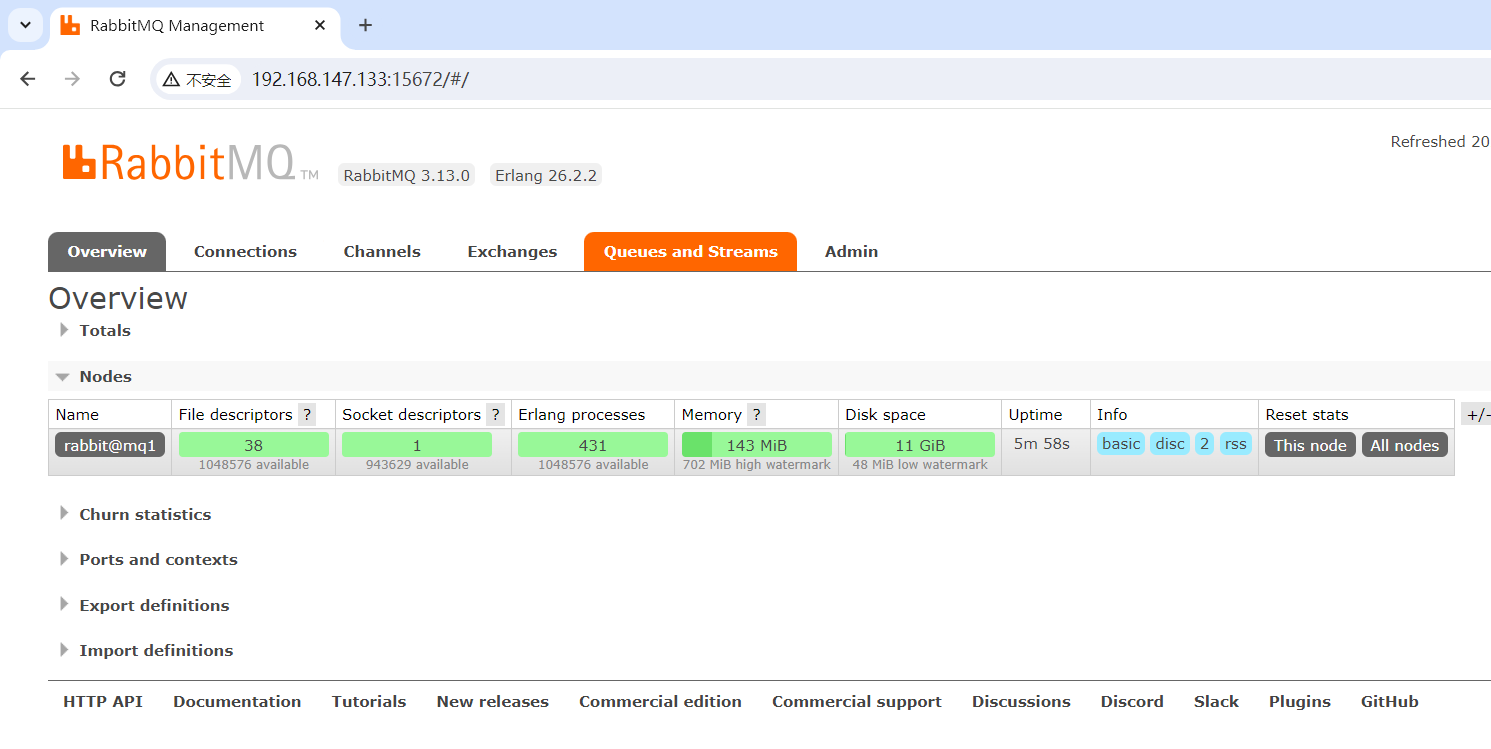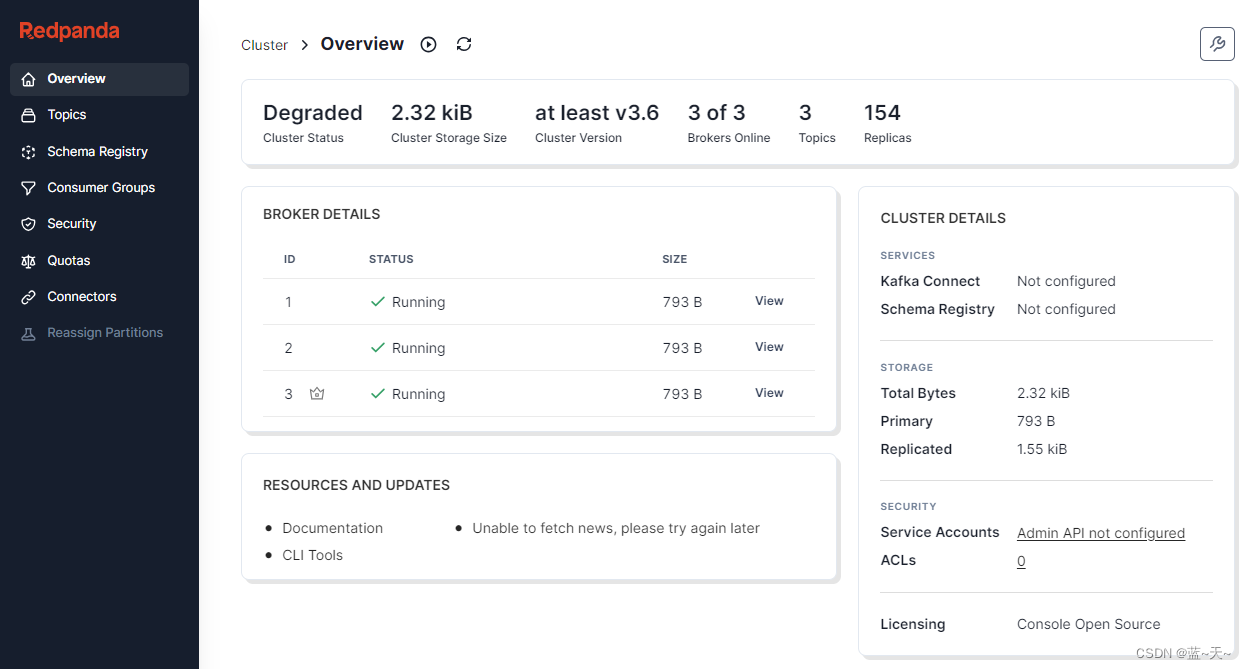文章目录
字符串处理函数
1、测量字符串长度strlen
#include <string.h>
size_t strlen(const char *s);
s指需要测量的字符串首元素地址
#include <stdio.h>
#include <string.h>
int main(int argc, char const *argv[])
{
char str[128] = "hello world";
printf("%d",strlen(str));
return 0;
}
2、字符串拷贝函数strcpy、strncpy
(1)strcpy
#include <string.h>
char *strcpy(char *dest, const char *src);
dest:目的空间地址
src:原字符串首元素地址
返回值:目的空间地址的首地址(新字符串地址)
如果遇到’\0’,直接结束
#include <stdio.h>
#include <string.h>
int main(int argc, char const *argv[])
{
char str[128] = "hello world";
char str2[128] = "";
strcpy(str2,str);
printf("%s\n",str2);
return 0;
}
(2)strncpy
#include <string.h>
char *strncpy(char *dest, const char *src, size_t n);
dest:目的空间地址
src:原字符串首元素地址
n :拷贝前n个,如果遇到’\0’,直接结束
#include <stdio.h>
#include <string.h>
int main(int argc, char const *argv[])
{
char str[128] = "hello world";
char str2[128] = "";
strncpy(str2,str,6);
printf("%s\n",str2);
return 0;
}
3、字符串追加函数strcat、strncat
(1)strcat
#include <string.h>
char *strcat(char *dest, const char *src);
将src指向的字符串追加到dest指向的字符串尾部
如果遇到’\0’,直接结束
#include <stdio.h>
#include <string.h>
int main(int argc, char const *argv[])
{
char dst[128] = "hello ";
char str[128] = "world";
strcat(dst,str);
printf("%s\n",dst);
return 0;
}
(2)strncat
#include <string.h>
char *strncat(char *dest, const char *src, size_t n);
将src指向的前n个字符串追加到dest指向的字符串尾部
如果遇到’\0’,直接结束
#include <stdio.h>
#include <string.h>
int main(int argc, char const *argv[])
{
char dst[128] = "hello ";
char str[128] = "world";
strncat(dst,str,3);
printf("%s\n",dst);
return 0;
}
4、字符串比较函数strcmp、strncmp
(1)strcmp
#include <string.h>
int strcmp(const char *s1, const char *s2);
s1字符串 s2字符串
返回值
>0 s1>s2
<0 s1<s2
=0 s1=s2
逐个字符比较,相同比较下一个,不同输出s1 - s2的ascll值
#include <stdio.h>
#include <string.h>
int main(int argc, char const *argv[])
{
char dst[128] = "ab";
char str[128] = "bb";
printf("%d\n",strcmp(dst,str));
return 0;
}
(2)strncmp
#include <string.h>
int strncmp(const char *s1, const char *s2, size_t n);
s1字符串 s2字符串
n:比较前n个
返回值
>0 s1>s2
<0 s1<s2
== s1=s2
#include <stdio.h>
#include <string.h>
int main(int argc, char const *argv[])
{
char dst[128] = "hello ";
char str[128] = "world";
printf("%d\n",strncmp(dst,str,3));
return 0;
}
5、字符查找函数strchr、strrchr
(1)strchr
#include <string.h>
char *strchr(const char *s, int c);
在字符串s 查找第一次出现的字符 c
返回:
成功返回地址
失败返回NULL
#include <stdio.h>
#include <string.h>
int main(int argc, char const *argv[])
{
char dst[] = "bvaa";
char c = 'a';
char *result = strchr(dst,c);
printf("%d\n",result - dst);//打印字符所在位置
return 0;
}
(2)strrchr
#include <string.h>
char *strrchr(const char *s, int c);
在字符串s 查找最后一次出现的字符 c
返回:
成功返回地址
失败返回NULL
#include <stdio.h>
#include <string.h>
int main(int argc, char const *argv[])
{
char dst[] = "bvaaasd";
char c = 'a';
char *result = strrchr(dst,c);
printf("%d\n",result - dst);//打印字符所在位置
return 0;
}
6、字符串查找函数strstr
#include <string.h>
char *strstr(const char *haystack, const char *needle);
返回值:
找到返回找到的地址
失败返回NULL
#include <stdio.h>
#include <string.h>
int main(int argc, char const *argv[])
{
char str[] = "heloalol worlod";
char *ret = strstr(str, "lol");
if(ret != NULL)
{
printf("%s\n",ret);
printf("%d\n",ret - str);//打印字符所在位置
}
return 0;
}
7、字符串转换
#include <stdlib.h>
atoi将字符串 转成 int类型
atol将字符串 转成 long类型
atof将字符串 转成 float类型
#include <stdio.h>
#include <stdlib.h>
int main(int argc, char const *argv[])
{
printf("%d\n",atoi("11"));
printf("%ld\n",atol("123"));
printf("%f\n",atof("3.14f"));
return 0;
}
#include <stdio.h>
#include <stdlib.h>
int main(int argc, char const *argv[])
{
char buf[] = "12345ass123gd";
int sum = 0;
int i = 0;
while (buf[i]>='0' && buf[i]<='9')
{
sum = sum*10 + (buf[i] - '0');
i++;
}
printf("%d\n",sum);
return 0;
}
结果输出12345
8、字符串切割
(1)strtok
#include <string.h>
char *strtok(char *str, const char *delim);
第一次切割:str必须指向 待切割的字符串的首元素地址
delim指向分割符”分割符”
后续切割:str传空NULL
返回值:
成功返回子串的首元素地址
失败返回NULL
#include <stdio.h>
#include <string.h>
int main(int argc, char const *argv[])
{
char str[] = "hel,oalolw,orlo,dsdfs,df,xc,fdgd";
char *buf[32] = {str};//存放子串首元素地址
int i = 0;
while (1)
{
buf[i] = strtok(buf[i] , ",");
if(buf[i] == NULL)
break;
i++;
}
i = 0;
while (buf[i] != NULL)
{
printf("%s\n",buf[i++]);
}
return 0;
}
9、格式化字符串
组包:按照需要的格式 组成字符串
解包:解析特定格式的数据
(1)sprintf
将零散的数据 按照固定的格式 组成字符串
#include <stdio.h>
sprintf(char *str, const char *format, ...);
sprintf函数会根据提供的格式字符串(format)将后面的参数(…)格式化为一个字符串,并将其存储在提供的目标字符串(str)中。
函数返回的是写入的字符数量,不包括字符串的结束符
#include <stdio.h>
int main(int argc, char const *argv[])
{
int year = 2023;
int manth = 10;
int day = 30;
char buf[128] = "";
int len = sprintf(buf,"%d-%d-%d-",year,manth,day);
printf("len = %d ,buf = %s\n",len,buf);
return 0;
}
结果
len = 10 ,buf = 2023-10-30
#include <stdio.h>
int main(int argc, char const *argv[])
{
char buf[128] = "";
sprintf(buf,"%d",1234);
printf("buf = %s\n",buf);
return 0;
}
(2)sscanf
①sscanf 和%d 提取’0’~ ’9’数字
#include <stdio.h>
int main(int argc, char const *argv[])
{
char buf[128] = "2023年7月26日";
int year = 0;
int manth = 0;
int day = 0;
sscanf(buf , "%d年%d月%d日",&year,&manth,&day);
printf("%d %d %d\n",year,manth,day);
return 0;
}
结果
2023 7 26
②sscanf 和%s 遇到’\0’ (空格)结束
#include <stdio.h>
int main(int argc, char const *argv[])
{
char buf[128] = "2023年 7月26日";
char str[128] = "";
sscanf(buf,"%s",str);
printf("%s\n",str);
return 0;
}
结果
2023年
③sscanf高级用法
跳过数据 % * d ,% * s
#include <stdio.h>
int main(int argc, char const *argv[])
{
char buf[128] = "";
sscanf("123:e1343","%*d:%s",buf);
printf("buf = %s\n",buf);
return 0;
}
结果
buf = e1343
读取指定宽度的数据:%[width]s %[width]d
#include <stdio.h>
int main(int argc, char const *argv[])
{
char buf[128] = "";
sscanf("1231343","%3s",buf);//宽度限制
printf("buf = %s\n",buf);
return 0;
}
结果
buf = 123
%[a-z]表示匹配a到z的任意字符
遇到不是a-z之间的字符跳出(可加条件%[a-z,0-9,A-Z])
#include <stdio.h>
int main(int argc, char const *argv[])
{
char buf[128] = "";
sscanf("asd12ascHI313ASDxc43","%[a-z]",buf);
printf("buf = %s\n",buf);
return 0;
}
结果
buf = asd
贪婪性
%[asd]匹配a,s,d中任意一员,依次输出符合数据,遇到不符合的跳出
#include <stdio.h>
int main(int argc, char const *argv[])
{
char buf[128] = "";
sscanf("adsdadsddcHI313ASDxc43add","%[adds]",buf);
printf("buf = %s\n",buf);
return 0;
}
结果
buf = adsdadsdd
% [ ^ asd]匹配非a,s,d中任意一员,匹配到a,s,d中任意一员跳出
#include <stdio.h>
int main(int argc, char const *argv[])
{
char buf[128] = "";
sscanf("qwfbcHI313AaSDxc43","%[^add]",buf);
printf("buf = %s\n",buf);
return 0;
}
结果
buf = qwfbcHI313A
**案例:**输出指定位置字符
#include <stdio.h>
int main(int argc, char const *argv[])
{
char buf[128] = "https://www.baidu.com";
char name[128] = "";
char log[128] = "";
sscanf(buf,"%[^:]://www.%[^.]",name,log);
printf("name= %s \n log= %s\n",name,log);
return 0;
}
结果
name= https
log= baidu
(3)const
①修饰普通变量为只读变量
#include <stdio.h>
int main(int argc, char const *argv[])
{
const int num = 10;
num = 100;//不允许修改只允许初始化
printf("%d\n",num);
return 0;
}
②修饰*
( * p只读 不能通过* p修改所指向的空间内容,p仍可读可写)
#include <stdio.h>
int main(int argc, char const *argv[])
{
int num = 10;
int data = 20;
const *p =#
num =100;
//*p =12;//不能修改
p = &data;//可读可写
printf("%d\n",num);
return 0;
}
③修饰 p
p不可修改 *p可修改
#include <stdio.h>
int main(int argc, char const *argv[])
{
int num = 10;
int *const p =#
*p =100;
printf("%d\n",num);
return 0;
}
10、如有错误欢迎指正

